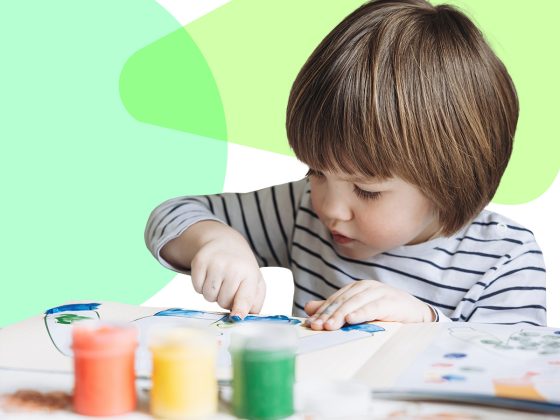
Creative, Talented, Amazing: A Conversation with Anna Wang, Co-founder of FCSN, about fostering autistic children’s talents
An article to help parents foster creative exploration and expression in their autistic child.
Anna, I understand your autistic son is very talented. Tell me more.
My child did not discover his musical talent until he was 19 years old. Which is very surprising to many people (and was to me, too!). People assume something like musical talent would show itself earlier in a child’s life. We’re so ingrained into how we—neurotypical people—traditionally learn. But when my son finally—and impressively!—showed his musical talent, it opened my eyes and my mind. I realized how little we really know about how a person with autism learns.
We tend to think that we need to have a teacher sit next to you and show you what to do. But my son was different. No one thought he was even paying attention to music. Then, one day, he was in a class where they were learning to play the flute recorder. It’s a high-pitched instrument and he wouldn’t get anywhere close to the teacher. In fact, he went to the corner of the room, put his fingers in his ears, and rocked back and forth.
After 20 minutes of instruction, the teacher asked if anyone could show her how to play a G note. The parents didn’t think anyone was paying attention. But to our surprise, my son came from the corner of the room and played not just the single note, but the whole song the teacher had demonstrated.
What did you learn from that experience?
What I realized, after I discovered my child’s musical talent, is that he had been learning all along, through our family and the environment we created around him. We hadn’t hired a formal music teacher for him, but he’d been absorbing music since he was very young at home. We listen to classical music. We listen to pop music. We even listen to cultural Chinese music. So even though he was not directly learning music, he was absorbing it.
How did your son change from that experience?
He learned by ear first. He loved the music, and he also liked when everyone applauded him for it! Then he picked up reading music. He’s more confident now. He even gets paid for performances now. He negotiates his rate and advocates for himself. It adds to his sense of achievement.
So, environment matters. What else might families consider when aiming to nurture their autistic child’s talents?
Be persistent. It’s all about giving them the opportunity to learn at their own pace, and to show you their talent when they are ready. A lot of parents give up after trying only for a little while, and only in the traditional way. The truth is, some of our traditional ways of teaching set autistic children up for failure. It’s a disservice to make them learn certain things a traditional way.
Provide a variety of learning opportunities. I always tell parents to expose children to as many things as you can and let them pick up the ones they want to pursue. Make music, art, sports, play, and more, a part of your child’s environment. Give as many opportunities as you can and provide many ways for them to engage throughout the day.
I want parents to remember that their children have tremendous capacity. We need to think beyond the usual way of learning, which can be quite limiting to autistic children. Instead, integrate their learning so that you’re hitting multiple learning areas (socialization, fine motor, math, art, etc.) in one activity.
Trust your child’s timing. And you know, sometimes, parents might think their child doesn’t have a particular talent or aren’t interested in something, because they check when the timing isn’t right. For instance, I checked on my son’s musical talent when he was five years old or ten years old, but I never thought to check at age 19. For him, it wasn’t until that moment when he’d absorbed enough to be ready to show the whole world that he is full of musical talent! We have to let them have the freedom to choose when to learn.
Celebrate the amazing in your child. Sometimes, young children are able and do show you their talents from a very young age, sometimes even before they can verbally speak. Sometimes parents get concerned about their child hitting (or missing) certain developmental milestones. Milestones are important, but for autistic children, they’re not everything. When they’re ready to speak, they will speak. Or they’ll find another way to communicate. I mean, my son is still not a great speaker, but he is speaking through his music.
And autistic children especially do so much incidental learning that we have to really notice: They might learn language by reading road signs as you drive in the car. They might strengthen their fine motor skills by writing letters in sand or a thick carpet. They might memorize movie credits or repeat commercial jingles. There are opportunities every day to celebrate and lean into the ways children are learning.
How does community factor into all this?
I know different kids have different challenges as well. I understand that there are parents who don’t see any light at the end of the tunnel. Community, like a small support group, can help—you can hold other parents’ hands and go through hard times with a brighter outlook.
In our community, we started with 10 families, and we’ve grown into an organization serving more than 1,000 families. We’ve since established an international special needs talent show, and we have found so many talented individuals. It’s just incredible and it brings so much hope for young parents who may have just received a diagnosis for their sons or daughters.
People sometimes think that “disability” means “no ability,” because a person can’t talk or socialize like everyone else. But they may have abilities that nobody can imagine. A diagnosis of autism or other special needs is not the end of your world or your child’s world. Instead, it can be an opportunity to discover a whole new world. And there’s so much beauty in it!
More about Anna Wang
Co-founder of Friends of Children with Special Needs (FCSN)
Anna Wang is one of the co-founders of FCSN, inspired and driven by the autism diagnosis of her son, Lawrence. During the 25 years since a group of parents came together, Anna has helped create many programs for children, adults, and families, fostered a sense of community, and been an outspoken advocate for the rights of special needs individuals.
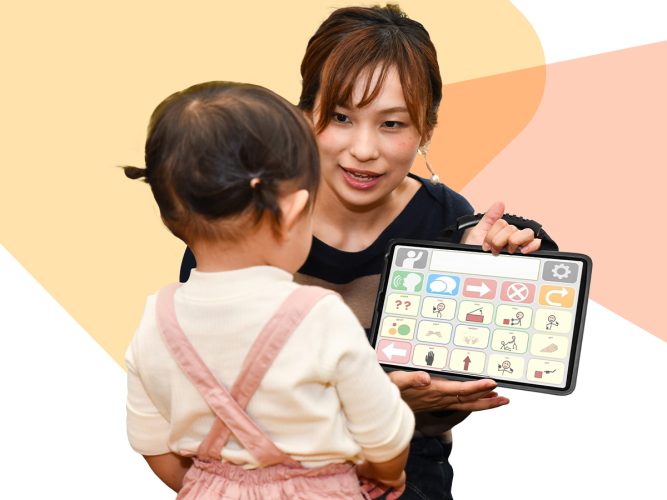
Exploring the Amazing in Autistic Children: A Conversation with Camille Proctor, Founder of The Color of Autism Foundation
An article to help parents discover and support their autistic child’s unique perspective and personality
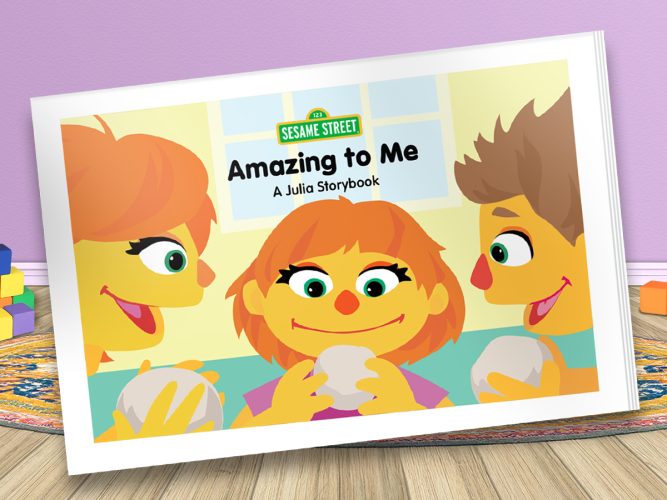
Amazing to Me
When Julia and her family do a special art activity together, Julia finds a way to add her own amazing touch!

Make a Pinch Pot!
Simple craft instructions to help your family make pinch pots from homemade dough together.
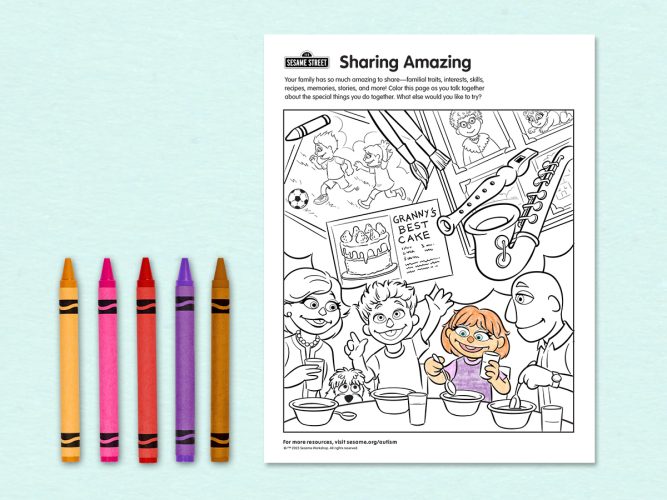
Sharing Amazing
An adult-child coloring page to spark ideas and connection.
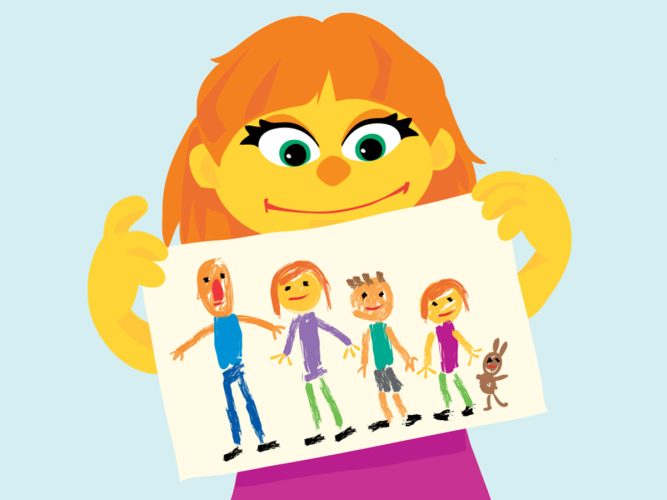
Autism and the Arts: A Conversation on Creativity and Community
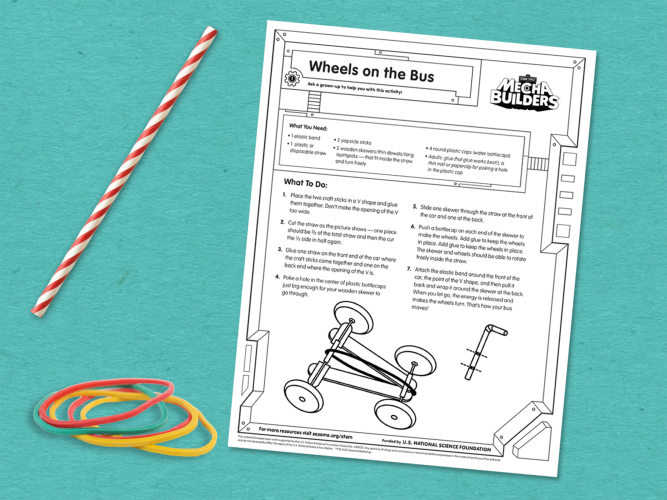
Make an Elastic Band Energy Car
Use this fun activity to engineer your own car!
